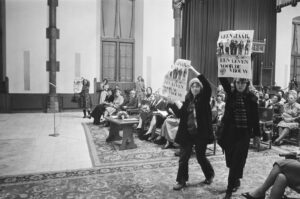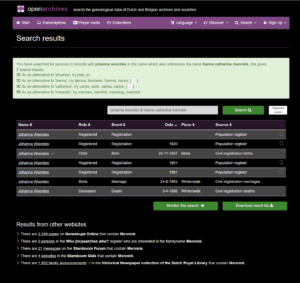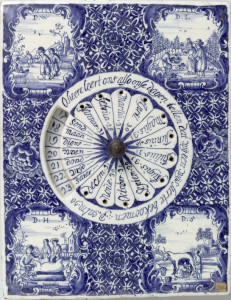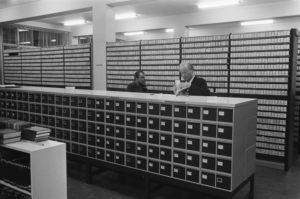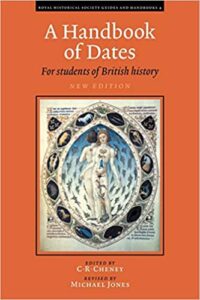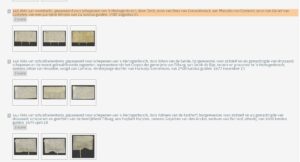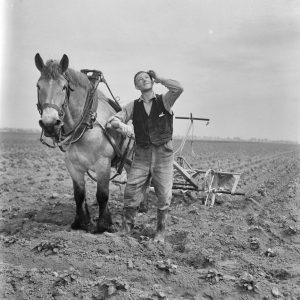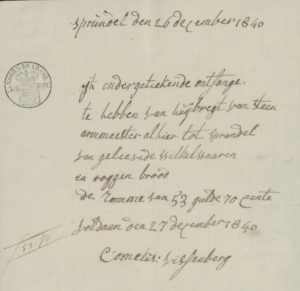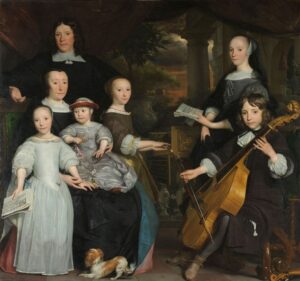While the Netherlands is known for its progressive and tolerant policies, this was not always the case. The country has a complicated history, including periods of religious and political turmoil and persecution of minority groups; some still occuring today. A few examples: Before 1795, only members of the Dutch Reformed church could hold public office. In the 1830s, the government oppressed people who had seceded from the Dutch Reformed Church. Seceder ministers would receive … [Read more...]
Use & at Open Archives
If you use Open Archives to search for your ancestors, try searching for two names by using the &-operator. It allows you to search for two different people who appear in the same record. Examples: Woordes & Mennink: two last names of one of my ancestral couples. This gives me their marriage record, birth, marriage, and death records of their children, and the population registers of houses where they lived together. This is my favorite type of query. Woordes & Hanna … [Read more...]
Quick tip – Check the calendar
If you are dealing with a date between 1582 and 1701, please check the calendar. Different places in the Netherlands changed from the Julian to the Gregorian calendar at different times. The change made the calendar jump forward by 10 or 11 days. Sometimes, you can resolve a conflict in dates by checking the calendar. Someone born in Brabant on 5 December 1699 could be baptized in Gelderland on 1 December 1699, for example, because Gelderland was still using the Julian calendar which was 11 … [Read more...]
Quick tip – Do online research first
If you are planning a trip to the Netherlands, do not assume you can do on-site research. Many of the most popular genealogical records can now be found online, as explained in this article. Archives typically no longer allow you to consult records that have been put online. … [Read more...]
Quick tip – Handbook of dates
In the course of my Family and Local History studies at the University of Dundee, I purchased a recommended book: C.R. Cheney, ed., A Handbook of Dates for Students of British History, revised (Cambridge: Cambridge University Press, 2004). While the title indicates it is meant for students of British history, most of the content is usable in the Netherlands too. Some of the topics I find especially useful for research in the Netherlands are: French Republican calendar, with the names of … [Read more...]
Quick tip – Search finding aids as well as indexes
Archives have different types of information on their website. The genealogical indexes are often found in a different section than the finding aids with the archival descriptions or catalogs. These descripts are often quite generic and describe whole series, like minutes of court records, incoming correspondence, or tax records. If you are lucky, the archival descriptions in the finding aids will also include names of people. Some archivists have made the effort to add the names of parties to … [Read more...]
Quick tip – Read between the lines
I am having fun with an 1827 inventory of the assets belonging to an ancestor. I love reading between the lines to see what the items tell us about my ancestor. Here are some things I noticed. He owned multiple plots of land, had different crops in the field, and had several types of grain stored. Agriculture was likely his main source of income. He owned three cows, one calf, no bulls. Three cows is not enough to live off, so they were probably for their personal use and for the manure … [Read more...]
Quick tip – No courthouse research in the Netherlands
In the Netherlands, we do not do any of our research in courthouses. If you are an American genealogist, you may be used to visiting the courthouse to get court records. In the Netherlands, such records are transferred to government archives after twenty years. They are typically public after seventy-five years. They are increasingly available online, either as scanned images or via scanning-on-demand. Otherwise, the records can be consulted at the archives in person. Access to court … [Read more...]
Poor relief records – Not just for poor folks
Several of my ancestors were poor. Some were so poor that they relied on charity. I have found several of them in the records of charitable organizations, such as the deacons of protestant churches, Holy Ghost tables of catholic churches, and civil poor administrations. When I went through the records, I also found ancestors who were not poor; in other capacities. These sources include many names besides the people needing poor relief: Officials, such as the deacons, Holy Ghost Masters, … [Read more...]
Quick tip – Who had the money?
When studying your ancestors, it is helpful to know who the rich people in the community were, even if your ancestors were poor. The rich people in the community may have interacted with your ancestors, and may have created records about them: Rich people may have employed them, for example as laborers, servants, or factory workers. They may have bought their products, for example in the case of shoemakers or weavers. They may have used their services, for example in the case of … [Read more...]
